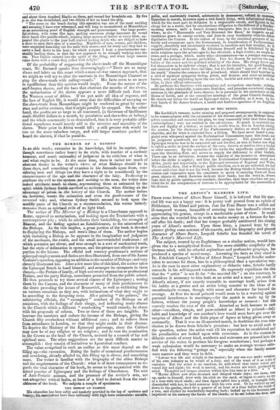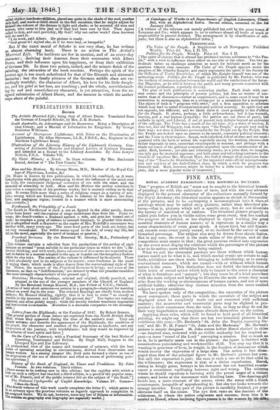THE ARTIST'S MARRIED LITE.
Faceir some letters of Albert Purer himself, it is- inferred that his max- ried h.& was not a happy one : it is pretty well proved from an epistle of Firkheimer, his friend and patron, that the Frau Durer was a selfish and ill-tempered woman, incapable of entering into her husband's views or appreciating his genius, except in a marketable point of view. It would seem that she worried him to work to make money as a fortune for her- self after his death ; and that her temper probably embittered the closing years of Albert's mother. Upon these hints, a journal kept by the painter giving some account of his travels, and the biography and general character of Albert Durer, Leopold Sahefer has founded his novel of The Artist's Married Life. The subject, treated by an-Engliehasan on a similar notion, would have given rise to a metaphysical fiction. The more chihnike simplicity of the German mind, with its ctherial aspirations and profotmder gropings, has produced a species of novel-essay. Assuming the facts as they stand in Dr. Friedrich Campe's "Relics of Albert Dower," Leopold Schefer under- takes to account for them, less in a philosophical than a speculative way. As is the case in most other explanatory or didactic tales, Scherer hardly succeeds in his self-imposed vocation. He expressly repudiates the idea that the " artist " is not fit for "the married life" ; on the contrary, he considers it necessary to him both as an artist and a man : yet much of Albert's misery, if not exactly traceable to marriage itselc arises from his habits as a g,enins and an artist being counter to the ideas of an unenthusiastic woman, though with sense and character far beyond the average. At first the moral pointed would seem to be a warning against parental interference in marriage,—for the match is made up by the fathers, without the young people's knowledge or consent : but this scarcely reaches the root of the evil. Attached as both become to each other—excellent, simple, and pure-minded as Albert is painted—daily habit and knowledge of one another's love would soon have got over the surprise of Albert and the little pique of Agnes at being given away so summarily. That it was an ill-assorted match, is doubtless the true con- clusion to be drawn from Schefer's premises : but how to avoid such is the question, unless the artist wait till his reputation be established and his peculiarities are looked upon with reverence. As is the custom m didactic novels of every kind, accidents and extremes are pressed into the service of the writer to produce his foregone conclusions ; but perhaps a weak submission would be necessary to make an average woman satis- fied with the following "goings on," especially when the family means were narrow and they were in debt. "Labour was life and delight to the master; for any one can make mention of his own. industry aa he would of a duty, and .of the want of ices a sin of omission. But the artist is no machine, no mill-wheel that turns round and round day and night; his work is mental, and his works are mind, produced by. mind. Thoughts and images slumber-within him like bees in a hive. *
"Master Albert now often dreamed and delayed whole days; sat down, rose up, spoke to himself, drew with his stick on the sand, or began to make an eye or a nose with black chalk; and then Agnes called him a child, or thought that, dissatisfied with her, he held converse with his own soul. Or he walked up and down in the garden, stood for a quarter of an hour at a time before the trunk df a tree, and studied its wonderfully-bursting bark; looked up to the heavens, and imprinted on his memory the forms of the clouds; or he eat before the door, and
called thither handsome children, placed one quite in the shade of the roof, another mil7 halt; and made a third stand in the full sunshine, that he might adjust for himself the colours of the dresses in light and shade; or he accosted old men and women, who came to him just as if they had been sent by God. Then Agues called to him, and said peevishly, My God! why not rather work? thou knowest well we need it. '1 do work, said Albert. My picture is ready.
"God grata it! sighed she, as if he were lazy, or incapable."
But if the exact moral of Sche&r is not very clear, he has written an almost charming hook. There is no action in The Artie., garried Life. The incidents are few in number, and of an every-day character ; deriving their interest from their connexion with Albert Durer, and their influence upon his happiness, or from their exhibition of German life. In these two points, iindeed, and the minute finish of the painting, the attraction of the book consists. Perhaps the spirit of the present age is too much substituted for that of the fifteenth and sixteenth rentariee : bat the -family pictures of the German middle class are ex- ceedingly truthful; the character of Albert, his love for his little daugh- ter, and his grief at her loss, are touching ; and the whole, notwithstand- ing its sad and unsatisfactory character, is yet attractive, from the re- signed submission of Albert Durer, and the manner in which the author stop short of the painful.



























 Previous page
Previous page